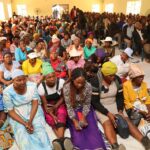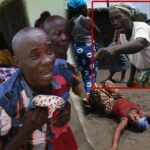Harare – War veteran and vocal government critic Blessed Geza has abruptly called off planned protests aimed at forcing President Emmerson Mnangagwa out of power, alleging a plot by state agents to frame him for terrorism. This dramatic turn of events follows a day of nationwide stayaways, highlighting the complex and multifaceted nature of opposition to the current regime.
Speaking late on March 31, Geza said he received intelligence reports suggesting that Major Sean Mnangagwa, who is the president’s son, was planning to plant bombs at strategic locations and then blame him for the attacks.
“I’ve decided to call off the protests… on hearing from intelligence sources that Major Sean Mnangagwa is planning to plant bombs in certain targets and designate me as a terrorist,” Geza announced, raising serious questions about the political climate and the lengths to which factions within the ruling party are willing to go.
His dramatic statement comes just hours after he declared that he would drive Mnangagwa from power this week, fuelling speculation over whether his decision to back down was due to security concerns or pressure from within ZANU PF’s factional battles.
Geza’s withdrawal from the protests underscores the deepening divisions within ZANU PF, as factions loyal to Mnangagwa and Vice President Constantino Chiwenga continue to clash.
“Now what’s next? I’ve decided to call off the protest. This is because I’ve gathered intelligence of an evil plan- Sean Mnangagwa has bought explosives. He wants to bomb, he wants to bomb certain targets tonight and blame it on me. This will be done to label me a terrorist. We had our peaceful protest today. Now let’s call it off for now.
“A statement has already been made. I’ll come back to you on Wednesday (tomorrow) with a very, very crucial announcement. This will change the direction of things and take us to a higher new level,” said Geza in his latest address to the nation published on Youtube last night.
So was this a failure or not? Judging Geza by what had set out to do in the first place, he did not succeed as anticipated to stir an uprising, but he succeeded in galvanising people to express their social discontent against Mnangagwa’s government. Geza did not get what he really wanted, but people also ignored Mnangagwa and government pleas for them to go to work, and act business as usual.
The reasons for the stayaway are varied, but include that people are disgruntled with Mnangagwa, they also tired of failed Zanu PF rule, fear of being caught up a violent confrontation and unwillingness to get drawn into Zanu PF’s internal succession power struggle. It is hard to argue that people stayed away because they did not want to be associated with Geza’s call for an uprising. Zimbabweans would not mind seeing the back of Mnangagwa by whatever means – the end justifies the means.
Zimbabwe has a long history of stayaways. People now know how to express their discontent without putting themselves in the line of fire as security forces usually ruthlessly crackdown on protests. Geza’s remarks were not just a call to action or merely an uprising, but also a scathing critique of Mnangagwa’s regime to wear it down through a war of attrition.
He accused the president of failing to run the country properly, corruption, nepotism, neglecting civil servants, and in the process mainly surrounding himself with “thieves, conmen, and heartless killers”. In this sense, Geza’s agenda can be seen as having partially failed or partially successful, as it local, regional and global brought attention to the grievances of the Zimbabwean people and put pressure on the government to address these concerns.
However, whether Geza’s ultimate goal of ousting Mnangagwa will be achieved remains to be seen. Only time will tell. The situation is complex, and the outcome depends on various factors, including the government’s response to the protests going forward, and the level of support Geza receives from the military and other key stakeholders, including the ordinary people, opposition parties and civil society. Yesterday was a political battle in a war which may take much longer to end whichever way. While Mnangagwa remains in power, his position has now become more precarious – even vulnerable to further pressure.
Adding another layer to the day’s events, Zimbabwean police were restrained, professional and better behaved in dealing with the stayaway and people’s attempt at peaceful streets protests. There are many and varied reasons why police, which is associated brutality, human rights abuses and impunity, was were restrained. The first is that there was no major security threat to President Emmerson Mnangagwa and his government from the stayaway. Insiders say the government had instructed police to adopt a more measured approach, in an attempt to minimise bad publicity and avoid further inflaming tensions.
The police were also cautious to avoid an escalation and not to provoke the protesters, fearing any aggressive actions could escalate the situation and lead to more widespread unrest. There have also been reports of divisions within Zimbabwean security forces, the police, the intelligence and army, with some elements sympathetic to the protesters’ grievances. This contributed to a more restrained police response. With the stayaway protest receiving international attention, and government and police wanted to avoid any actions that could be perceived as heavy-handed or repressive.

Follow @MyZimbabweNews












